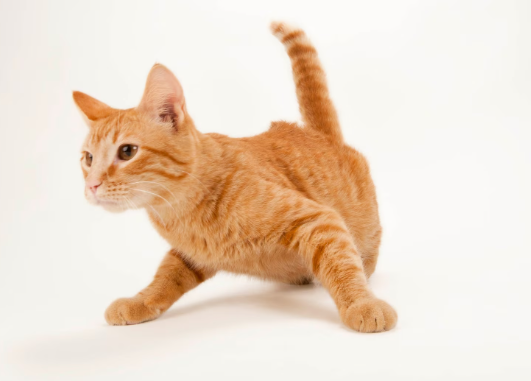As devoted cat owners, our first priority is to make sure our furry friends are healthy and happy. A vital component of their general well-being is keeping a healthy weight. Pet owners frequently wonder, “Is my cat overweight?” and answering this question requires a combination of knowledge, observation, and—most importantly—informed action. We will examine the symptoms of feline obesity, possible health risks, and solutions in this investigation. We’ll also address questions on feline nutrition that are relevant, including “What does a cat eat?” and “Can cats eat milk and bread?”
Indices That a Cat Is Fat:
1. Physical Form:
A cat in good health should have an evenly shaped body with a waist that can be seen behind the ribs. If your cat seems chubby or doesn’t have a noticeable waist, it can be overweight.
2. Difficulty Maintaining:
Although cats are thorough groomers, an overweight cat may find it difficult to get in some places, which could result in a decrease in grooming habits. This could lead to a dull or disheveled coat
3. Mobile Concerns:
Cats who are overweight may find it difficult to walk, jump, or climb. If your cat seems reluctant or finds these exercises difficult, it may be overweight.
4. Inhalation Issues:
Cats who are overweight may experience apparent alterations in their breathing patterns due to strain on their respiratory system. Panting or difficult breathing could be signs that weight control is necessary.
The Effects of Feline Obesity on Health:
1. Diabetes:
Cats who are overweight have a higher chance of getting diabetes. Being overweight can exacerbate insulin resistance, which raises blood sugar levels
2. Joint Problems:
The extra stress that being overweight places on joints can lead to arthritis and less mobility, which will lower the cat’s quality of life in general.
3.Congenital Cardia:
In cats, obesity is associated with a higher risk of heart disease. Heart problems may arise from the heart having to work harder to pump blood throughout the body.
4. Problems with the Urinary Tract:
Cats that are overweight are more likely to experience urinary system problems, such as bladder irritation and the development of crystals or stones.
Handling Obesity in Cats:
1. Seek advice from a veterinarian
The first thing you should do if you think your cat may be overweight is to see a veterinarian. They are able to evaluate your cat’s general health, establish the appropriate weight, and offer personalized guidance on activity and diet.
2. Equilibrium Diet:
Putting into practice a portion-controlled, balanced diet is essential for managing weight. Eating premium cat food that is suitable for your cat’s age and condition will help them lose weight.
3. Daily Workout:
With intriguing toys and interactive play, promote regular activity. Exercise encourages a healthy lifestyle and mental stimulation in addition to aiding with weight management.
4. Watchful Reward:
Reducing the quantity of sweets consumed and opting for nutritious substitutes can greatly aid in managing body weight. To select treats that are appropriate for your cat, speak with your veterinarian.
Associated Nutrition Questions for Cats:
1. Do Cats Find Raspberry Plants Toxic?
Cats can safely consume raspberries in moderation, but it’s important to be mindful of any potential contaminants in the area around them. It’s critical to detect and keep any potentially dangerous plants or materials out of your cat’s reach, as the query “are raspberry plants toxic to cats” highlights.
2. Diet of the Cat
Maintaining optimal health in cats requires an understanding of their dietary requirements. A more thorough investigation of feline nutrition is prompted by the question “What cat eats?” and highlights the need of feeding your cat a diet that is both balanced and species-appropriate.
3. Can Milk and Bread Be Eaten by Cats?
It’s a common myth about can cats eat bread and milk always appreciate a bowl of milk and a piece of bread. Although they might like the flavor of milk, many adult cats are really lactose intolerant, which can cause stomach problems. In a similar vein, although cats might nibble on bread, it has no nutritional benefit and may lead to obesity.
Final Thought:
Acknowledging and tackling feline obesity is a proactive measure to guarantee the longevity and welfare of our cherished felines. Cat owners can actively support their cat’s health by being aware of the warning signs of obesity, comprehending the possible health consequences, and acting sensibly after consulting a veterinarian. Concurrently, delving into associated feline nutrition inquiries, like “can cats eat bread and milk?” and “are raspberry plants toxic to cats?” expands our knowledge of feline nutritional requirements. By adhering to a balanced diet, providing regular exercise, and providing attentive care, cat owners can help their feline friends maintain good health and happiness for the duration of their lives.

